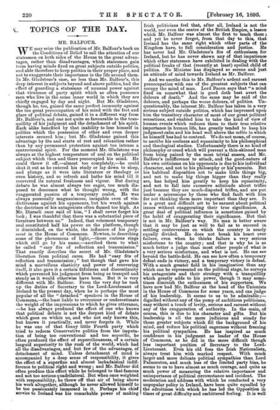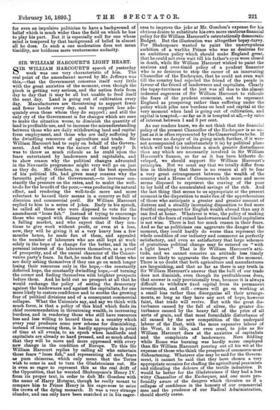TOPICS OF THE DAY.
MR. BALFOUR.
WE may seize the publication of Mr. Balfour's book on the Conditions of Belief to call the attention of our statesmen on both sides of the House to the great advan- tages, rather than disadvantages, which statesmen gain from having minds fixed on great subjects outside politics, and able therefore to keep politics in their proper place, and not to exaggerate their importance in the life around them. In Mr. Gladstone's case, no less than Mr. Balfour's, this deep interest in subjects beyond and above politics, had the effect of guarding a statesman of unusual power against that virulence of party spirit which so often possesses men who live in the same inner world in which they are chiefly engaged by day and night. But Mr. Gladstone, though he, too, gained the same perfect immunity against the too great preoccupation of his mind with the fret and glare of political debate, gained it in a different way from Mr. Balfour's, and one not quite so favourable to the tran- quillity of his judgment and the detachment of his spirit. Each alike benefited by that inability to lose himself in politics which the possession of other and even deeper interests secured him ; but Mr. Gladstone gained this advantage by fits and starts of rest and relaxation rather than by any permanent protection against too intense a controversial spirit. For the moment Mr. Gladstone was always at the highest temperature of zeal on the political subject which then and there preoccupied his mind. He could throw it off,—almost too completely,—he could shut it out as he entered his study or lay down to sleep, and plunge as it were into literature or theology or even history, and so refresh and bathe his mind till it recovered its natural freshness and vigour. But during debate he was almost always too eager, too much dis- posed to denounce what he thought wrong, with the exaggerated passion of a temporary zealot. He was always personally magnanimous, incapable even of vin- dictiveness against his opponents, but his wrath against the doctrines of his antagonists often flamed too high. As Mr. Disraeli once said of him, "I shall never forget his look ; I was thankful that there was a substantial piece of furniture between us." Indeed, that vehement temporary zeal constituted half his power on the platform, though it diminished, on the whole, the influence of his judg- ment in the House of Commons. Newton, in describing some of the phenomena of light,—those curious rings which still go by his name,—ascribed them to what he called "easy fits of reflection and transmission." That exactly describes the secret of Mr. Gladstone's liberation from political cares. He had "easy fits of reflection and transmission ; " but though that gave his mind a marvellous elasticity and power of recovering itself, it also gave it a certain fitfulness and discontinuity which prevented his judgment from being as tranquil and steady as it would otherwise have been. But it is very different with Mr. Balfour. From the very day he took up the duties of Secretary to the Lord-Lieutenant of Ireland to the present day, when he is perhaps the most popular of all the " detached " speakers in the House of Commons,—the least liable to overcotour or underestimate the weight of the impressions to which he gives utterance, —he has always produced the effect of one who knows that political debate is not the deepest kind of debate which goes on within us, and who not only knows this, but knows it practically, and never forgets it. While he was one of that funny little Fourth party which tried to redeem Conservative politics from the imputa- tion of being too conventional and too soporific, he often produced the effect of superciliousness, of a certain languid superiority to the rush of the world, which had all the disadvantages, and but few of the advantages, of detachment of mind. Unless detachment of mind is accompanied by a deep sense of responsibility, it gives the effect of a superfine and almost lackadaisical indif- ference to political right and wrong ; and Mr. Balfour did often produce this effect while he belonged to that famous and not too serious quadrilateral. But when once weighted with responsibility, he threw off that air of being above his work altogether, although he never allowed himself to be too passionately immersed in it. Perhaps his chief service to Ireland was his remarkable power of making Irish politicians feel that, after all, Ireland is not the world, nor even the centre of the British Empire, a lesson which Mr. Balfour was almost the first to teach them ; and yet he never forgot, from that day to this, that Ireland has the same right which other parts of the Kingdom have, to full consideration and justice. He has never had Mr. Gladstone's fits of enthusiasm for Ireland, but he has never shown any of that impatience which other statesmen have exhibited in dealing with the political freaks of that (recently at least) spoiled child of politics. No Minister has displayed so serene and just an attitude of mind towards Ireland as Mr. Balfour.
And we ascribe this to Mr. Balfour's ardent and earnest preoccupation with one of the greatest subjects that can occupy the mind of man. Lord Bacon says that "a mind fixed on somewhat that is good doth best avert the dolours of death." And the same may be said of the dolours, and perhaps the worse dolours, of politics. Un- questionably, the interest Mr. Balfour has taken in a very serious subject outside politics, which has impressed upon him the transitory character of most of our great political sensations, and enabled him to take the kind of view of human events which reduces them to their true relative importance in human life, has greatly tended to keep his judgment calm and his head well above the melite in which he himself has had to contend. We do not mean, of course, to ascribe his coolness and equanimity to his philosophical and theological studies. Unfortunately there is no kind of philosophy or creed which will prevent a thin-skinned man from being pained by the most trivial sneers, and Mr. Balfour's indifference to attack, and the good-nature of his own criticisms on his opponents is due to his individual character, and not to his philosophy or hiffpursuits. But his habitual disposition not to make little things big, and not to make big things bigger than they really are, has helped him greatly to keep his equanimity, and not to fall into excessive solicitude about trifles just because they are much-disputed trifles, and are put under a microscope by those who find fault with him for not thinking them more important than they are. It is a great and difficult art to be earnest about political issues without exaggerating their true significance. A. great deal of political influence is sometimes gained by the habit of exaggerating their significance. But that is not in Mr. Balfour's way_ No man is better aware that it may be just as well to fail as to succeed in settling controversies on which the country is nearly equally divided. He does not break his heart over failure, even when he thinks failure a very serious misfortune to the country ; and that is why he is so much better a judge than most other people of what is a very serious misfortune, and what is not. He can see beyond the battle-field. He can see how often a temporary defeat ends in victory, and. a temporary victory in defeat. With a much greater field in his imagination than any which can be represented on the political stage, he surveys his antagonists and their strategy with a tranquillity which greatly adds to his power, though it may some- times diminish the enthusiasm of his supporters. We have now had Mr. Balfour at the head of the Unionists in the House of Commons for some years, and can judge of his leadership. It seems to us to be admirable ;— dignified without any of the pomp of ambitious politicians, easy without a touch of levity, serious and earnest without any of the exaggeration of authority. In the main, of course, this is due to his character and gifts. But his leadership is all the more judicious and steady for those greater subjects which fill the background of his mind, and reduce his political eagerness without freezing his political sympathies. He has inspired as much confidence in his judgment as leader of the House of Commons, as he did in the more difficult though less important position of Secretary to the Lord- Lieutenant. Even his old foes the Irish Nationalists, always treat him with marked respect. With much larger and, more delicate political sympathies than Lord Palmerston, and much less of the limited party bias, he seems to us to have almost as much courage, and quite as much power of measuring the relative importance and unimportance of political circumstance and incident. The moderation and address with which he conducted a very unpopular policy in Ireland, have been quite equalled by the adroitness with which he has led the Opposition in times of great difficulty and embittered feeling. It is well for even an impulsive politician to have a background of belief which is much wider than the field on which he has to play his part. But it is especially well for one whose mind is tempered by that background of belief in almost all he does. In such a one moderation does not mean timidity, nor boldness mere venturesome audacity.



































 Previous page
Previous page